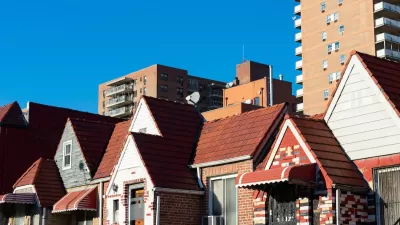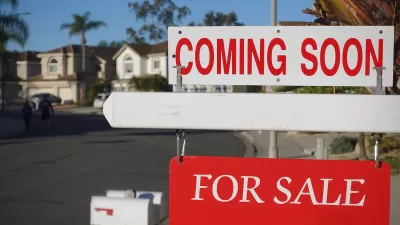Paul Krugman, one of the most influential voices of liberal policy in the United States, has identified a culprit in the U.S. affordability crisis: over-regulation.

Paul Krugman begins an op-ed that identifies land use regulations as the cause of the affordability crisis in urban America by establishing some historic context. "Specifically, urban America reached an inflection point around 15 years ago," writes Krugman, "after decades of decline, central cities began getting richer, more educated, and, yes, whiter. Today our urban cores are providing ever more amenities, but largely to a very affluent minority."
The big question of the op-ed, however, is why? And a second question: "is there any way to spread the benefits of our urban renaissance more widely?"
First, Krugman credits/blames the modern high-wage earner, willing to pay a premium to live closer to work and reduce commute times. " Hence gentrification," writes Krugman. "And this is a process that feeds on itself: as more high earners move into urban centers, these centers begin offering amenities: — restaurants, shopping, entertainment — that make them even more attractive."
Then, Krugman echoes the words of Jason Furman, the chairman of the White House Council of Economic Advisers, who recently began a public relations campaign, of sorts, about the effects of restrictive land use policies on housing supply and housing affordability.
"The good news is that this is an issue over which local governments have a lot of influence. New York City can’t do much if anything about soaring inequality of incomes, but it could do a lot to increase the supply of housing, and thereby ensure that the inward migration of the elite doesn’t drive out everyone else. And its current mayor understands that."
The conclusion of the article promises more on the subject of housing policy and what it will take to deliver on the supply that Krugman desires.
FULL STORY: Inequality and the City

Alabama: Trump Terminates Settlements for Black Communities Harmed By Raw Sewage
Trump deemed the landmark civil rights agreement “illegal DEI and environmental justice policy.”

Planetizen Federal Action Tracker
A weekly monitor of how Trump’s orders and actions are impacting planners and planning in America.

How Atlanta Built 7,000 Housing Units in 3 Years
The city’s comprehensive, neighborhood-focused housing strategy focuses on identifying properties and land that can be repurposed for housing and encouraging development in underserved neighborhoods.

In Both Crashes and Crime, Public Transportation is Far Safer than Driving
Contrary to popular assumptions, public transportation has far lower crash and crime rates than automobile travel. For safer communities, improve and encourage transit travel.

Report: Zoning Reforms Should Complement Nashville’s Ambitious Transit Plan
Without reform, restrictive zoning codes will limit the impact of the city’s planned transit expansion and could exclude some of the residents who depend on transit the most.

Judge Orders Release of Frozen IRA, IIJA Funding
The decision is a victory for environmental groups who charged that freezing funds for critical infrastructure and disaster response programs caused “real and irreparable harm” to communities.
Urban Design for Planners 1: Software Tools
This six-course series explores essential urban design concepts using open source software and equips planners with the tools they need to participate fully in the urban design process.
Planning for Universal Design
Learn the tools for implementing Universal Design in planning regulations.
Caltrans
Smith Gee Studio
Institute for Housing and Urban Development Studies (IHS)
City of Grandview
Harvard GSD Executive Education
Toledo-Lucas County Plan Commissions
Salt Lake City
NYU Wagner Graduate School of Public Service





























